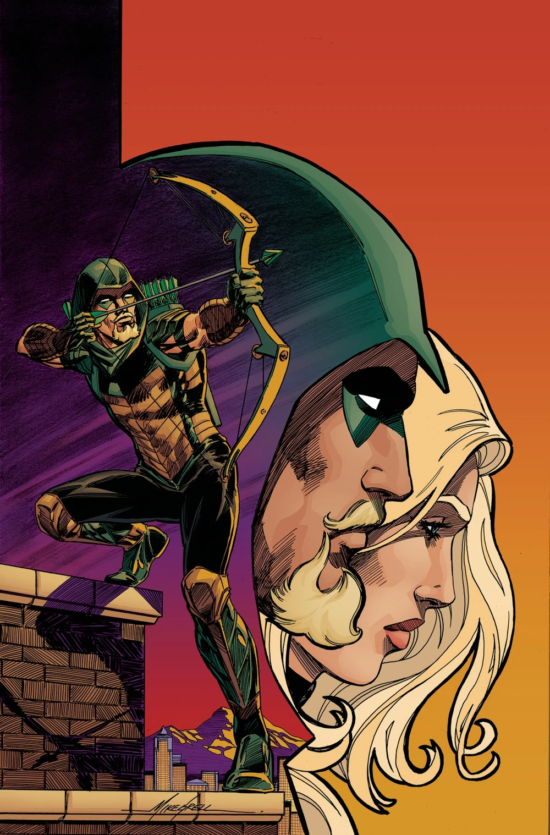The Law is a Ass #461: Green Arrow’s Witness Complication Program

I needed a quickie.
I meant, to get back into the swim of things after a couple of out-of-town trips, many stints of babysitting the grandkids (including one in which my wife and I stayed in their house for several days while their parents were on an out-of-town trip), and one brief, mild fling with COVID-19 kept me from writing columns for the past several months, I needed a column I could write quickly. Green Arrow #33 (2017) fit the bill perfectly.
It came out half a decade ago. That’s longer than the half-life of my memory. Meaning, I don’t remember it well enough to write a detailed recap. That should help speed things up.
Actually, to start this recap I have to go back even farther. Back to Green Arrow #2 (2016) when Green Arrow was fighting the Ninth Circle, a global bank which loans out money to criminals so they can do things like build secret bases in extinct volcanoes, buy piranhas by the Costco load or launch satellites with goyim space lasers. (Hey, the Ninth Circle is evil, you think it would have problems funding anti-Semites?) Meanwhile in the same issue, Oliver (Green Arrow) Queen’s secretary, Wendy Poole, died.
Only she didn’t. Die, that is. She came back. No, not in the typical the-dead-comes-back-to-life comic book cliché kind of way. She came back in the, the-bad-guys-kidnap-her-make-it-look-like-she’s-dead-and-frame-the-hero-for-her-murder comic book cliché kind of way. So Oliver Queen was arrested for Wendy Poole’s murder.
Oliver Queen posted bail. Than skipped bail, leaving town so that Green Arrow could travel all over the country teaming up with other members of the Justice League to regain their trust and take out the local Ninth Circle franchises on the other heroes’ home towns.
This I didn’t understand. Green Arrow has to regain the JLA’s trust? The JLA wouldn’t believe Green Arrow had been framed and would think he had turned murderer? Who on the JLA hasn’t been framed for a murder by some criminal? Hell, several of them probably had it happen to them earlier that same week.
Anyway, after DC published enough issues of Green Arrow traveling around the country to fill out a respectable trade paperback collection, Ollie returned to Seattle. Where he still faced trial for whacking Wendy.
Which brings us up to where we started Green Arrow #33 (2017) because that’s the issue where Kate Spencer, Ollie’s lawyer, learned that Wendy Poole was actually alive. And for the first time in her representation of Oliver Queen, Kate saw some hope. I wasn’t a high-priced defense attorney full of them fancy tricks you see on TV, but even I, a lowly public defender, know you can’t prosecute someone for murder when the supposed victim is alive and appears in court.
There was only one flaw in Kate’s plan. Wendy, who is living with her father, was traumatized by her experience. Father told Kate that he and Wendy couldn’t help Ollie, because whoever took her will “come after her if they know she’s still alive.” If they know? How could they not know? Haven’t they seen she was missing? Even Barney Fife checked Mayberry’s holding cells from time to time.
Kate went to Ollie, I assume to give him the good news and have him help convince his secretary to come forward. Instead, Ollie also forbade Kate from revealing that Wendy was alive to get him out of the predicament. “She’s gone through hell because of me.” Such nobility. It endeared Ollie to the reader but ticked off his lawyer no end. Kate stomped off think Ollie had won the noble sheesh prize.
Is that how it would work? If Ollie told Kate that she couldn’t call Wendy as a witness, couldn’t Kate call her anyway? No. And here comes maybe the quickest legal analysis I’ve ever done in the history of this column.
Lawyers are supposed to represent their clients in the manner in which their clients want to be represented. Unless the client wants the lawyer to do something that’s against the law, like put on perjured testimony or shoot the eyewitness between the “I” and the “do,” lawyers are ethically bound to represent their clients the way the clients want that representation to go.
If a lawyer wants to put on an insanity defense but the client says no, insanity cannot be presented. If the lawyer wants to call the not-really-dead murder victim to the stand to prove the client didn’t kill the victim and the client says no, it’s no. That’s the way it is. Sometimes the attorneys who don’t represent themselves have fools for clients.
So what happened to Ollie? Did he go to trial and get convicted of murder because of his nobility? No. After all, this was issue 33 of a Green Arrow series that lasted 50 issues. It would have been kind of hard to have the series go that long if the main character was convicted of murder in issue #34 and spent the next 15 issues in the slammer.
How did Ollie not get convicted? I don’t know. I told you at the beginning of this column that I didn’t remember all the details of this story line. Do you think my memory has gotten better after several more paragraphs? Law schools have a phrase lawyers can employ in cross-examination, “Is your memory like a fine wine? Does it improve with age?” In my case, “My memory does not get better with age,” is a fine whine.











